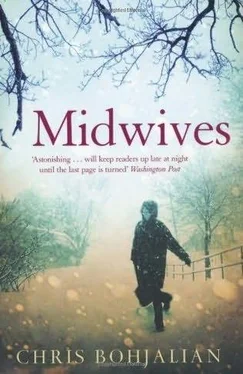Chris Bohjalian - Midwives
Здесь есть возможность читать онлайн «Chris Bohjalian - Midwives» весь текст электронной книги совершенно бесплатно (целиком полную версию без сокращений). В некоторых случаях можно слушать аудио, скачать через торрент в формате fb2 и присутствует краткое содержание. Жанр: Современная проза, на английском языке. Описание произведения, (предисловие) а так же отзывы посетителей доступны на портале библиотеки ЛибКат.
- Название:Midwives
- Автор:
- Жанр:
- Год:неизвестен
- ISBN:нет данных
- Рейтинг книги:5 / 5. Голосов: 1
-
Избранное:Добавить в избранное
- Отзывы:
-
Ваша оценка:
- 100
- 1
- 2
- 3
- 4
- 5
Midwives: краткое содержание, описание и аннотация
Предлагаем к чтению аннотацию, описание, краткое содержание или предисловие (зависит от того, что написал сам автор книги «Midwives»). Если вы не нашли необходимую информацию о книге — напишите в комментариях, мы постараемся отыскать её.
Midwives — читать онлайн бесплатно полную книгу (весь текст) целиком
Ниже представлен текст книги, разбитый по страницам. Система сохранения места последней прочитанной страницы, позволяет с удобством читать онлайн бесплатно книгу «Midwives», без необходимости каждый раз заново искать на чём Вы остановились. Поставьте закладку, и сможете в любой момент перейти на страницу, на которой закончили чтение.
Интервал:
Закладка:
I want to be there when she has her first baby so much.
I want to be there when she has all her babies.
And when the idea that I might miss out on something like that crossed my mind today, I'd zone out as fast as I could and focus on something else. Anything else. Like that chandelier. I'd seen the courtroom before when I was charged back in the spring, but I hadn't looked around that day and so I hadn't noticed the chandelier. After all, all I'd really done that morning was breeze in in my little spring dress while Stephen said, "Not guilty, Your Honor." Took about two seconds.
But I saw the chandelier today, I couldn't miss it. And it's a beauty, it really is. A huge wrought-iron thing that hangs down from smack in the center of the ceiling. The bulbs sit inside these delicate glass tulips, and the metalwork is a series of the most amazingly graceful curlicues and swirls. A lot of times, it was just so much easier for me to get a picture in my head of those tulips or those swirls than the faces of the people being asked all sorts of questions about home birth and midwifery. Stephen and Bill Tanner must have talked to thirty or thirty-five people today, and they still haven't agreed upon who will be on the jury and who won't.
So, as Stephen said, "We get to do this again tomorrow." I just can't believe it.
I think there were four or five people up there today who hated me without even knowing me. That wouldn't have bothered me once. Before Charlotte died, I don't think it fazed me a bit when I came across a person who hated me for what I did. I think I viewed it as their problem, not anything I needed to lose sleep over. It was like, "Hey, you deal with it. That's your trip, not mine."
But it really freaked me out today. It really frightened the hell out of me.
From where I sit, I can see Lake Memphremagog, and every so often this afternoon when a possible juror was explaining how all of his children had been born in a hospital because it's safer, I'd try to get a picture of the water in my mind. Then I could stare at the guy and look like I was listening, when all I was seeing was the lake.
I'll bet that water's cold right now, incredibly cold.
This just isn't a good time of the year for a trial like this. At least for me. Everything's dying, or going brown. I didn't used to mind the fall. I do this year. That's another thing that seems to be different with me since Charlotte died. Suddenly I dislike the fall.
There were moments today when I found myself staring at the water in the lake and getting the chills when I thought about where I might be when it freezes.
– from the notebooks of Sibyl Danforth, midwife
DOCTORS DO NOT PROTEST, they lobby. They are not the sort of people who will stand around outside a courthouse with placards and sandwich boards, or hold hands and sing rally songs. Mid-wives, on the other hand, are. Midwives are exactly the sort of folk who will use public spectacle to make a political point.
And so while doctors made their presence felt in a variety of powerful ways before and during my mother's trial-they just loved to testify-they did not stand on the steps of the Orleans County Courthouse.
That responsibility fell upon the midwives.
The Monday my mother's trial began, my family was greeted in Newport by somewhere between sixty and seventy people, counting the midwives and their clients. There were women whose faces I recognized, like Cheryl Visco and Megan Blubaugh, Molly Thompson and Donelle Folino, and there were a great many women and men I'd never seen before, but who, apparently, believed passionately in a woman's right to labor in her own bedroom. There were some of my mother's patients there as well, faces I remembered from prenatal exams at our house as recently as the previous winter. Inside, we'd soon discover, were even more of my mother's clients, quietly knitting or nursing in the three back benches.
We saw the supporters as soon as we drove down Main Street that morning, standing like a phalanx along both sides of the courthouse steps and in long lines on the grass that extended out from the walkway to the front door. We had driven to Newport in my mother's distinctive old station wagon, and so we were recognized immediately, and a cheer went up as we coasted into the parking lot between the courthouse and the lake.
"Set Sibyl free, let babies be!" was the first chant we heard from the group, and we heard it the moment we emerged from our car. Of all the chants we'd hear over the next few weeks (and we'd hear many), that one was my least favorite. It implied my mother wasn't free; it suggested prison and confinement and my family's destruction.
Unfortunately, to this day it's the one I hear most often in my head. The others-either doggerel that linked hospitals with laboratories, or ditties that elevated home birth to a religious rite-come back to me when I think hard about those weeks, but they don't pop into my head today like bad songs while I'm seeing patients or brewing coffee.
As planned, Stephen and a young associate from his firm were already waiting for us in the parking lot when we arrived. There had been a frost the night before, so even though the sun was well up by eight-thirty, the air still felt cool and I could see Stephen's breath when he spoke.
"You have some fans," he said, motioning toward the demonstration across the street.
My mother smiled. "Are you behind this?"
"God, no! We made sure we'll have some friends once we get inside the courtroom-quiet friends-but those campers over there came on their own. Don't get me wrong, I'm perfectly happy they're here, but I had nothing to do with it."
The adults all shook hands, and I was introduced to Stephen's associate, a man a few years his junior named Peter Grinnell. Peter lacked Stephen's polish, and it was clear he had a liking for fried dough and sausage heroes-the epicurean specialties of the town and county fairs that begin in Vermont in early August and continue until the first weekend in October. His hair was thin, his skin unhealthy, and he needed to lose a good thirty or forty pounds.
I couldn't imagine where this fellow fit into the dignified-downright intimidating-law firm I'd seen a glimpse of that day in Burlington; I was surprised someone like Stephen even wanted him working there. Peter was wearing an overcoat, so I couldn't see his suit, but I found myself hoping it was, as Stephen would say, one click above whatever Bill Tanner would be wearing.
"How do you feel, Sibyl?" Stephen asked.
My mother shrugged. "I can feel my heart beating pretty fast. But I think I'm okay."
"Fired up?"
"No, Stephen, you know I'm not," she said, shaking her head, and she sounded almost resigned. "I'm not a fired-up kind of lady."
"They are," he said, and he pointed with his thumb like a hitchhiker at the midwives and home birthers behind us.
"They're not me."
"Well, you look-" Stephen stopped himself midsentence, a pause that was at once awkward and uncharacteristic for my mother's lawyer. "You look like you're ready," he said finally.
What Stephen meant to say, I've always assumed, was that my mother looked beautiful. Or heroic, perhaps. Or courageous. Because my mother did look, at least to me, like all of those things. She seemed tired and she was pale, but looking back, I think I understand in a twisted way why at least one nineteenth-century convention of female beauty was vaguely tubercular-why, even at the end, Bram Stoker's Lucy Westenra and Mina Harker were still considered lovely. My mother had a cornflower-blue clip holding back her blond hair, and she was wearing a modest, almost schoolgirl-like green kilt she'd bought specially for the occasion. Unlike the other midwives both inside and outside the courthouse, she wore leather loafers and stockings.
Читать дальшеИнтервал:
Закладка:
Похожие книги на «Midwives»
Представляем Вашему вниманию похожие книги на «Midwives» списком для выбора. Мы отобрали схожую по названию и смыслу литературу в надежде предоставить читателям больше вариантов отыскать новые, интересные, ещё непрочитанные произведения.
Обсуждение, отзывы о книге «Midwives» и просто собственные мнения читателей. Оставьте ваши комментарии, напишите, что Вы думаете о произведении, его смысле или главных героях. Укажите что конкретно понравилось, а что нет, и почему Вы так считаете.











